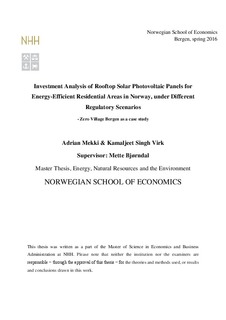Investment analysis of rooftop solar photovoltaic panels for energy-efficient residential areas in Norway, under different regulatory scenarios : Zero Village Bergen as a case study
Master thesis
Permanent lenke
http://hdl.handle.net/11250/2403511Utgivelsesdato
2016Metadata
Vis full innførselSamlinger
- Master Thesis [4372]
Sammendrag
In Norway, buildings are responsible for 50% of stationary energy consumption; therefore
reducing their carbon-footprint is an important area of research. Solar photovoltaic (PV) panels
have seen significant technological improvements and cost reductions over the last years. The
high degree of scalability and ease of integration into buildings have made solar panels a
potential means of reducing the carbon footprint of buildings. Zero Village Bergen (ZVB) is a
large-scale residential real estate project in Western Norway that aims to use solar panels to
achieve a near-zero emission residential area.
This thesis analyses the risks and net present value (NPV) of projected investment in solar
panels in ZVB, across four regulatory scenarios and two different ownership structures. It is
found that, in this context, the NPV would be negative for all scenario-ownership structure
combinations, but that the results vary significantly between scenarios and ownership
structures. Substantial improvements in the cost or revenue side of the project would be
required to reach profitability. These results suggest that either the house-owners must pay a
premium for the apartments in ZVB, or the government would need to provide subsidies.
